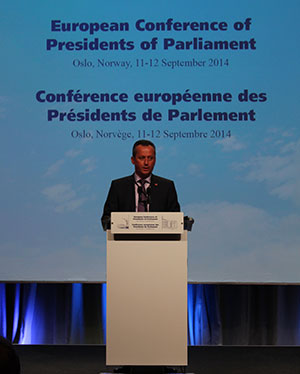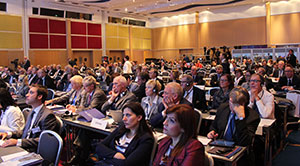 Friday, 12 September 2014, Oslo
Friday, 12 September 2014, Oslo
ADDRESS OF THE PRESIDENT OF THE ASSEMBLY OF THE REPUBLIC OF MACEDONIA, MR. TRAJKO VELJANOSKI ON MAJORITY AND OPPOSITION - STRIKING A BALANCE IN DEMOCRACY
Distinguished Chairperson,
Distinguished colleagues,
Ladies and gentlemen,
If we take into consideration that the democracy is a political system based on the possibility, the citizens to elect their representatives and that this particular right of election of those representatives is the fundamental and essential concept of democracy – it should mean existence of an appropriate balance between the majority, as the winner in the election process and the opposition, on the other side as counterbalance of the governance as a side for which less voters cast their votes, but whose decision has to be respected.
The opposition is a necessity in a democratic society.
Literature and comparative analysis demonstrate that one can recognize several types and forms of opposition, depending on the nature and manner of functioning of the political system. Regardless of the shape of opposition or the definition thereof, one thing is common; it does not belong to the parliamentary majority or the governing coalition and expresses its arguments and criticism for the activities of the government constantly competing with it. The existence of the opposition by itself is not sufficient for political dialogue, political will is also needed, but above all capacity and ability to play the role of effective and quality opposition. To speak of true opposition, hence for the necessity from appropriate balance with the majority, the opposition has to have and demonstrate ability to effectively and responsibly participate in the political process. If this is not the case, I would say, a contradiction can occur, in other words the meaning of the existence of such opposition is lost, and the need for opposition remains.
The opposition has a serious role in the system, and if it is potentially unable to carry that role, then who will be the corrective of the governance? Who shall exercise the aims that need to be achieved?
 Perhaps I give more specific tone to this topic, but allow me to underline that the Republic of Macedonia is young democracy, last week we celebrated 23 years of independence, and in these 23 years we worked hard and with dedication to take, implement and practice the best examples and practices from the older, experienced and democratically proved states. Believe me, we succeeded. In the interest of the time, I will only speak of the part which refers to the opposition. The work of the Assembly of the Republic of Macedonia is stipulated by a Law on the Assembly and the Rules of Procedure, whose provisions does not favor the governing majority alone, neither the opposition, but secure equality and responsibility for each MP in the overall process of adoption of laws, in other words, in all activities of the Parliament.
Perhaps I give more specific tone to this topic, but allow me to underline that the Republic of Macedonia is young democracy, last week we celebrated 23 years of independence, and in these 23 years we worked hard and with dedication to take, implement and practice the best examples and practices from the older, experienced and democratically proved states. Believe me, we succeeded. In the interest of the time, I will only speak of the part which refers to the opposition. The work of the Assembly of the Republic of Macedonia is stipulated by a Law on the Assembly and the Rules of Procedure, whose provisions does not favor the governing majority alone, neither the opposition, but secure equality and responsibility for each MP in the overall process of adoption of laws, in other words, in all activities of the Parliament.
I would only mention part of the practical solutions as a proof of my statement. One of the three Vice Presidents of the Assembly is elected upon a proposal and from the opposition. Several important and specific working bodies of the Assembly are chaired by a MP from the opposition. Each month, at a session dedicated on Parliamentary Questions, the opposition MPs have the right to pose twice as many questions than the MPs from the parliamentary majority. The MPs from the opposition participate in all coordinative meetings and the meetings of the Presidency where the dynamics of the work of the Assembly is agreed and where decisions on the manner of work are being adopted.
The addition of the Law on Assembly, additionally strengthen the rights and obligations of all MPs. This law in particular strengthened the oversight role of the Parliament over the executive government, thus providing the opportunity for each Committee to organize oversight debate on particular topic, a debate for the implementation of a particular law.
 All these and many other mechanisms and practices are introduces in direction of valorizing the need for existence of the opposition and existence of a balance between the opposition and majority, But, as I mentioned, having an opposition alone is not enough, sometimes it is not sufficient to have balanced conditions for its functioning either. A political responsibility and maturity is needed. It is also needed the capability of the opposition to offer political alternatives through the development of the alternative political solutions for the decisions of the government and the representatives of the majority. It is needed to constantly promote interest of their voters and to actively work on stability, legitimacy, responsibility and transparency of the political process. In the democratic society, the opposition should be a possibility for political changes through the democratic means, providing active contribution in the political pluralism.
All these and many other mechanisms and practices are introduces in direction of valorizing the need for existence of the opposition and existence of a balance between the opposition and majority, But, as I mentioned, having an opposition alone is not enough, sometimes it is not sufficient to have balanced conditions for its functioning either. A political responsibility and maturity is needed. It is also needed the capability of the opposition to offer political alternatives through the development of the alternative political solutions for the decisions of the government and the representatives of the majority. It is needed to constantly promote interest of their voters and to actively work on stability, legitimacy, responsibility and transparency of the political process. In the democratic society, the opposition should be a possibility for political changes through the democratic means, providing active contribution in the political pluralism.
Thank you.